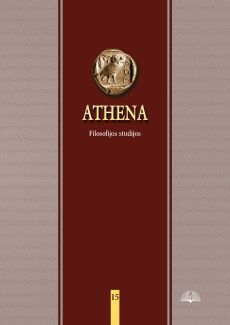Ideologija anapus idėjų
Ideology Beyond Ideas
Author(s): Nijolė KeršytėSubject(s): Political Philosophy, Social Philosophy, Contemporary Philosophy
Published by: Lietuvos kultūros tyrimų
Keywords: ideology; practices; Althusser; Bourdieu; Lithuanian Song Festival;
Summary/Abstract: For a long time, ideology has been perceived as a system of ideas or images used to achieve or preserve power. The first to renounce the concept of ideology as a conscious system of ideas was Louis Althusser. To provide a material basis for ideology, he associated it with the sphere of actions or practices that function in social institutions (“apparatuses”). Later, Althusser’s concept of ideology was accused of being deterministic. However, such accusations are inaccurate, because to function, ideology needs a “free” individual that voluntarily becomes a subject of ideology, rather than the one that is forcefully subjugated to a particular order. And yet, it is true that in Althusser’s philosophy the tension between ideological subjugation and transformative power of ideology remains unresolved. This issue is addressed by a sociologist Pierre Bourdieu who proposes a practice theory as a critique of practical reason of a Kantian ambition. Althusser speaks of practices purely theoretically and abstractly, while Bourdieu is concerned how practices are grasped cognitively as well as how practices could be described scientifically. Bordieu’s praxeology attempts to overcome the dualism of reason/action, consciousness/unconsciousness, free will/determinism as the tension between freedom of individuals and structural determinism, between activity and passivity, the reproduction of social order and its transformation. It shows how ideas exist as actions or how praxis is influenced by ideology. Bourdieu’s praxeology appears as highly relevant in the analysis of “other” or distant in time practices. Its relevance is even more pronounced observing how Soviet practices are analyzed in Lithuania. A case in point is Nerija Putinaitė’s analysis of the Lithuanian Song Festival during the Soviet period. It is shown that her analysis functions as an unreflective to its implications critique of ideology whose function is to discredit rather than explain. It analyzes practice as an Althusserian apparatus (passive subjugation to order) rather than as a proposed by Bourdieu dynamic model of social field, which implies that the interaction between agents is influenced by their habitus. Indeed, the Lithuanian Song Festival as a practice is interesting because it appears as a field where ideological clashes take place. It proves the legitimacy of Bourdieu’s critique of the concept of apparatus, as well as encourages us to rethink Althusser’s notion of the subject of ideology. Ultimately, it makes us view the adaptation to Soviet regime differently: not as passive submission, but as a continuous recomposition of powers and ideological negotiations with the regime.
Journal: Athena: filosofijos studijos
- Issue Year: 2020
- Issue No: 15
- Page Range: 169-198
- Page Count: 30
- Language: Lithuanian

